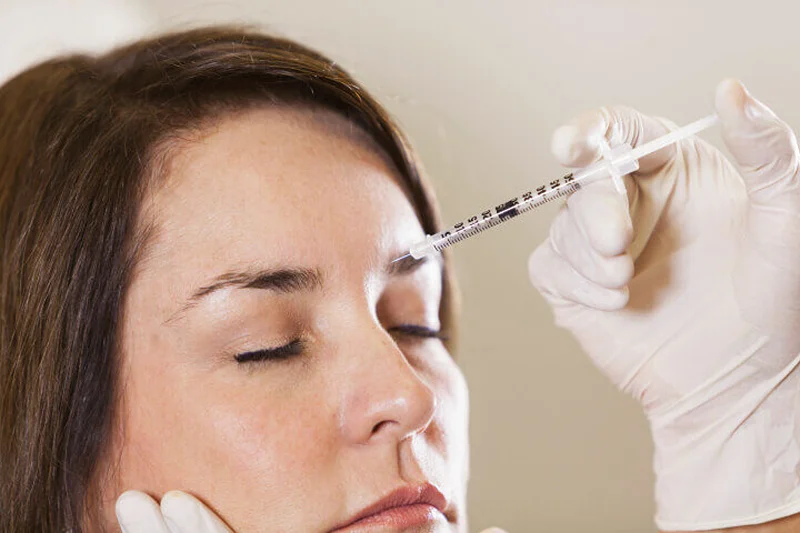Swelling After Botox Forehead Treatment: A Cause For Alarm?

Botox treatments have a variety of side effects, though none of them are usually serious or a cause for alarm. However, first-time botox patients may be a little concerned if the side effects that they experience are normal or could be an early sign that Botox may not work for them. Botox treatments centered around the forehead are a particular concern of many patients, given that the side effects like swelling are more apparent there.
But should you worry about swelling after a botox treatment? In most cases, swelling of any kind after botox treatment is normal and should subside within one to two days. However, there are rare cases where swelling (especially if accompanied by other symptoms like bruising, a droopy eyelid, or redness) may seem more concerning. While you should definitely report these to your botox provider, it’s most likely not something you should be worried about.
With just a few simple injections, our providers can erase your wrinkles and fine lines in no time with Botox. Call us today to book your appointment.
Why You Can Experience Swelling After Botox Forehead Treatments
The forehead is one area of the skin that sees a lot of wrinkle formation, mostly because the muscle groups in that part of your face tend to contract and move around a lot. This increased activity makes developing a forehead wrinkle or other fine lines in your skin more likely, though there are also other factors that can affect your chances.
But by applying botulinum toxin to the injection site, your dermatologist or plastic surgeon is able to use cosmetic botox treatments to stop muscle movement and smoothen the skin. Swelling is a natural by-product of the process of the Botox procedure itself since the skin will have to recover from the injection treatment and absorb the botox into itself.
For cases like brow ptosis or lazy eye treatment, forehead injections may cause additional swelling since the amount of Botox needed may be slightly higher than cosmetic treatments for treating issues like crows feet. But still, the botulinum toxin injection itself is unlikely to cause drastic side effects aside from mild swelling.
When To Be Worried
However, there are some cases where the swelling refuses to go down after a few days of rest, or when it’s accompanied by other symptoms like bruising and discoloration. While these cases are not life-threatening, they can signal that something has gone wrong with either the Botox procedure or your body’s reaction to Botox itself.
Bad Botox
Most cases that involve prolonged swelling after botox treatment usually mean that a patient has received an injection of bad botox. Like dermal filler used in a filler treatment, Botox injections have a limited shelf life and will expire around two years from the date of manufacture. This isn’t limited to unused botox either – if the botox has been mixed with saline, there’s only a four-hour window for its recommended use before it breaks down in potency.
Admittedly, there are a variety of botox complications that can be triggered by bad botox, but in very mild cases, only swelling occurs. If you experience persistent swelling, it may be best to inform your botox provider to check the expiration date of the specific botox unit that was used in your treatment.
Allergic Reaction
A rarer complication that occurs after botox injection is an allergic response – but similar to the application of bad botox, other symptoms may also occur. Typically, it’s unusual for a patient to be allergic to Botox itself – in most cases, this is caused by the product used to reconstitute your botox injection. If water is used instead of saline, this means that your body will take more time for the toxin to be absorbed by the body.
True allergic reactions to botox treatments are usually accompanied by difficulty breathing, hives, redness, and other allergic reactions. If you only experience swelling and no other symptoms after your botox treatment, it could mean that you’re allergic to something else that was used in the procedure. In most cases, topical anesthetics are usually the culprit.
Overall, swelling after botox treatments is normal, especially when it’s used for forehead lines. Unless a blood vessel has been punctured by the injection itself (interrupting blood flow and usually caused by the needle straying into the eyebrow), any swelling you experience is completely normal and will subside in two days.
Wellness Treatments, Botox Cosmetic Injections, And Other Beauty Procedures At aNu Aesthetics

Swelling after a Botox treatment isn’t unheard of, though you should keep in mind that it should only last for about 24 to 48 hours after your treatment. Any longer may mean that something has gone wrong with your Botox injection or you’ve had an allergic reaction to something with your Botox treatment. If the swelling is accompanied by other symptoms like eyelid droop, frozen facial muscles, or muscle weakness, consult your dermatologist immediately.
aNu Aesthetics has extensive experience as a long-term botox injector, using our familiarity with this cosmetic procedure to treat cosmetic and medical concerns alike. Whether it’s getting rid of facial wrinkles or managing conditions like excessive sweating, we’re confident that your botox appointment will give you the results that you want. Call us today to learn more about the services we provide.
With just a few simple injections, our providers can erase your wrinkles and fine lines in no time with Botox. Call us today to book your appointment.